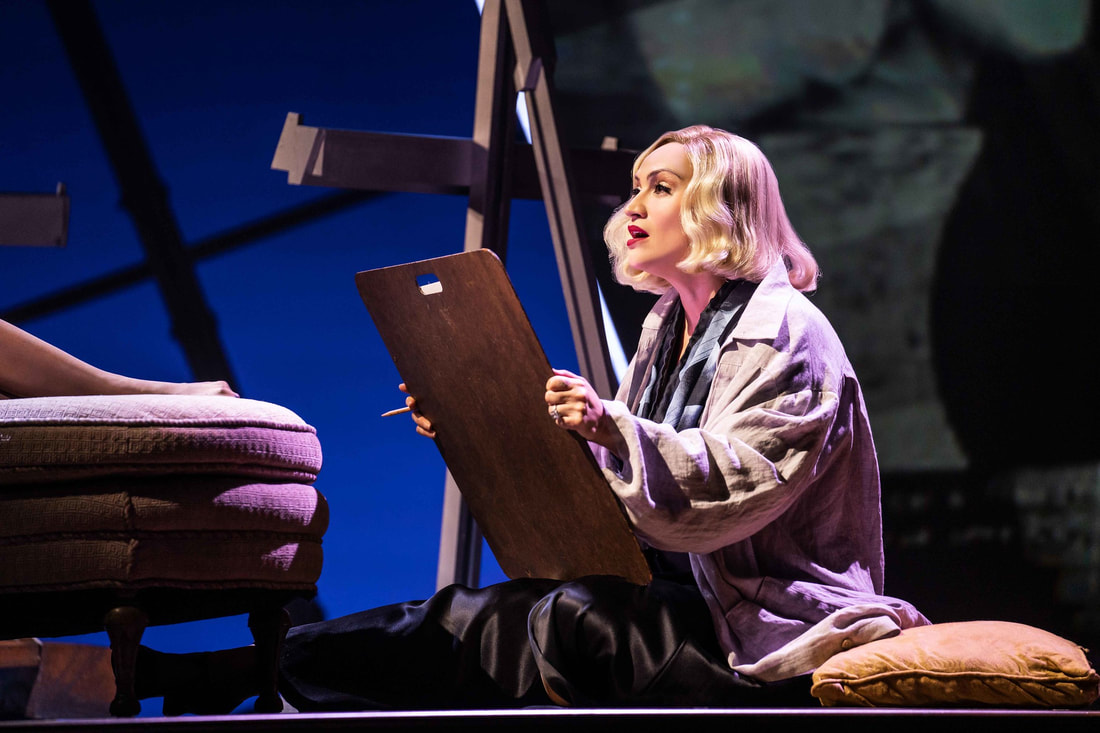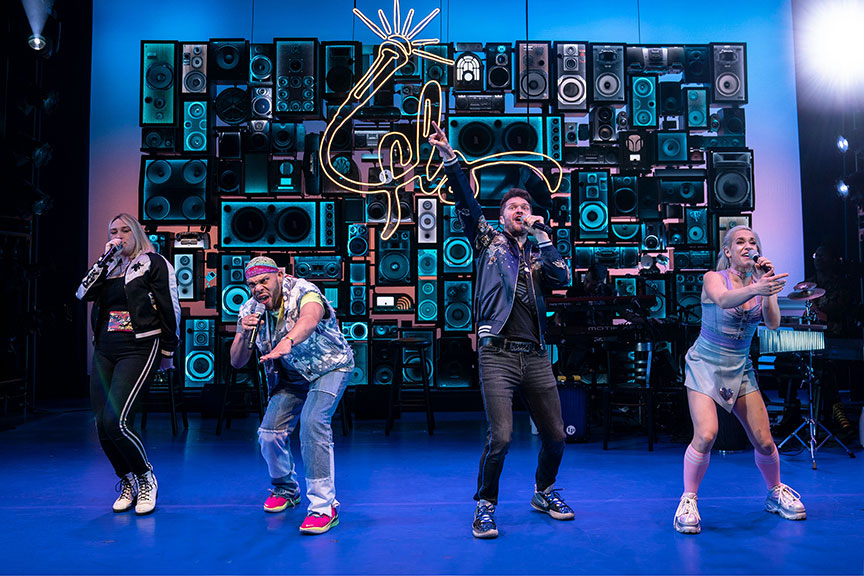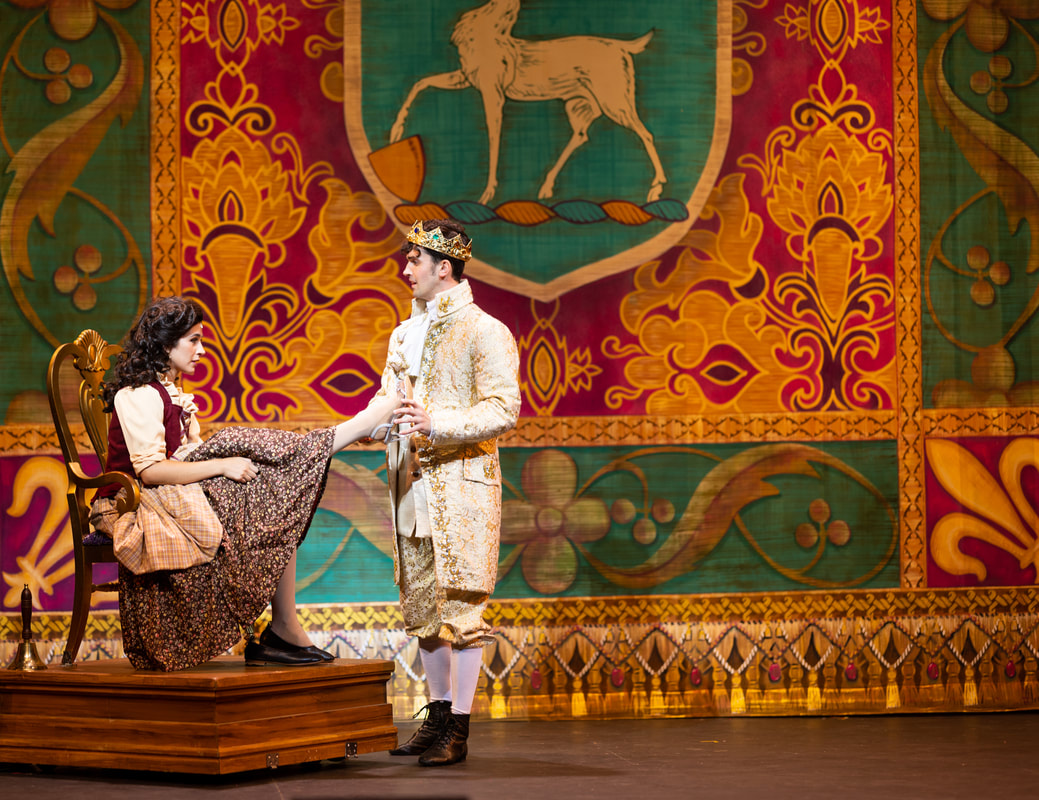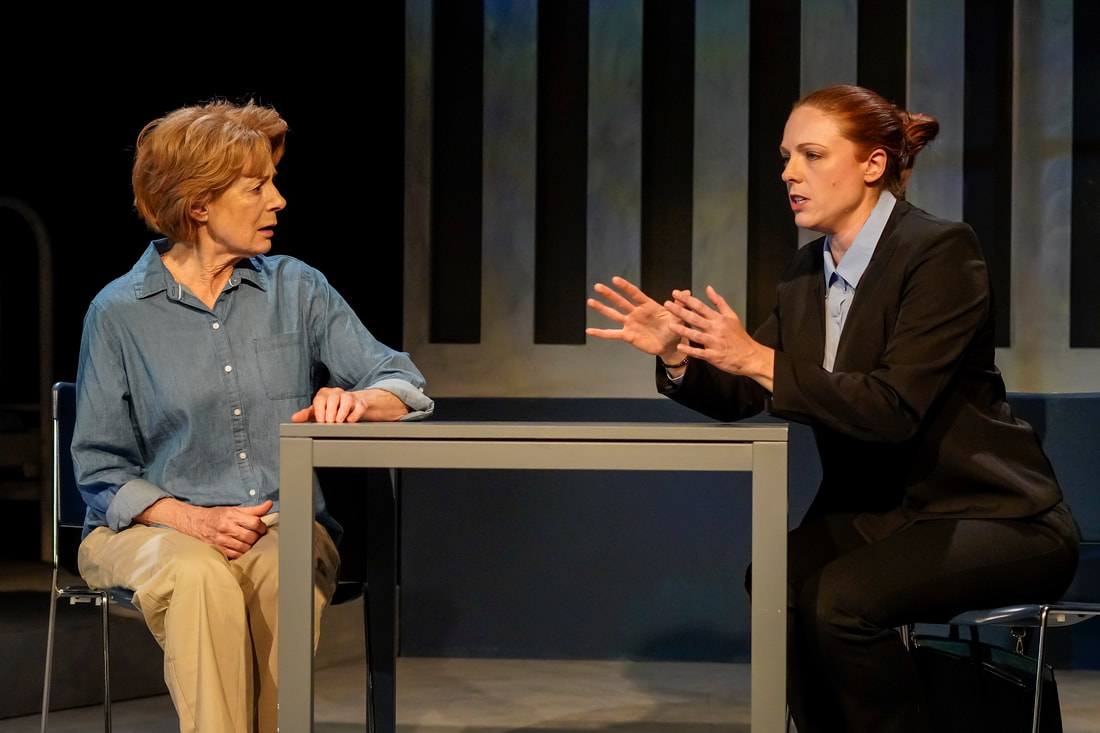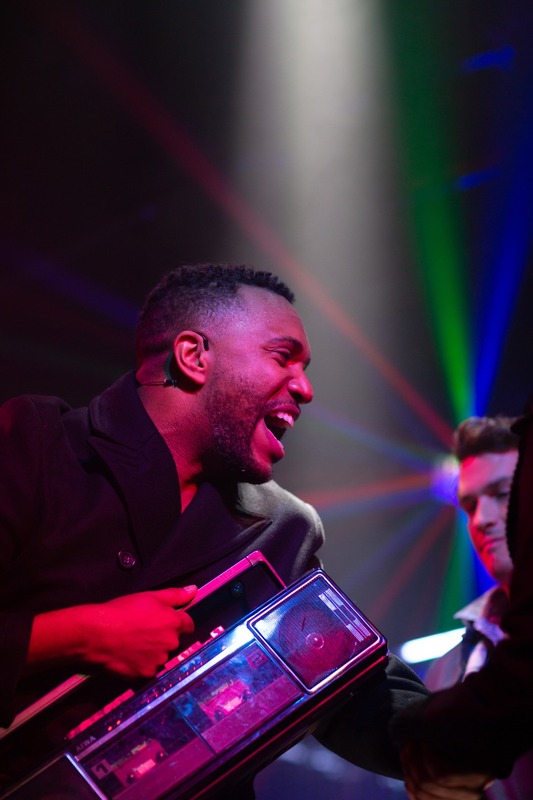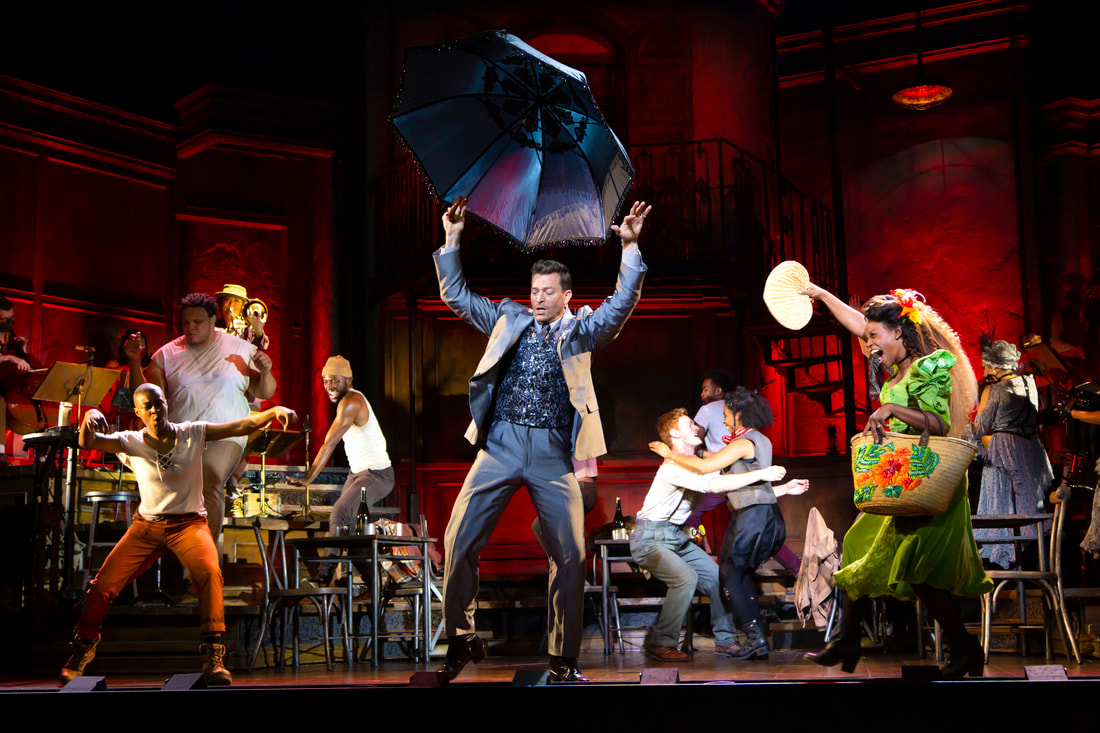|
Eden Espinosa in "Lempicka." Photo courtesy of La Jolla Playhouse More than once in the musical “Lempicka,” art student Tamara de Lempicka is decried by her teacher, the despotic Filippo Marinetti, as being a “difficult woman.” Women who are dauntless, ambitious and uncompromising, whether in the arts or not, are still being decried by threatened men as difficult, part of which makes Lempicka’s story as told in this dynamic new show at La Jolla Playhouse so contemporary and magnetic.
All the ingredients are here for “Lempicka,” which was originally planned to open in La Jolla in spring 2020, to be a Broadway-bound hit. Its director is Rachel Chavkin, who was at the helm of the hit “Hadestown” in New York. Its star is Eden Espinosa (“Wicked,” “Falsettos,” “Brooklyn the Musical”). Its cast includes Amber Iman, who portrayed Nina Simone on Broadway in “Soul Doctor.” Its staging in La Jolla is electric, with exciting choreography by Raja Feather Kelly, and stunning lighting (Bradley King) and projection (Peter Nigrini) design. It’s a production that’s as bold onstage as Tamara de Lempicka was in her turbulent life. With a book and lyrics by Carson Kreitzer and book and music by Matt Gould, “Lempicka” made its world premiere at the Williamstown Theatre Festival in 2018 in Massachusetts. Its subject: a Polish-born artist working prolifically in the Art Deco motif whose synthetic cubist portraits and nudes made her a darling of aristocrats, proto-feminists, and lesbians and bisexuals during the bohemian postwar ‘20s in Paris. Wow. That’s a foundation for a tale that begs telling. It’s told in “Lempicka” with a few liberties from historical fact, but very much in the spirit of this woman’s career ascendance and personal-life complications. After the introduction of a weary and cynical Lempicka (Espinosa) in L.A., land of “avocados and oranges” and plastic dreams in the early ‘70s, the narrative shifts back in time to the first of her many life-altering events. As a young woman, she is forced to flee her St. Petersburg, Russia, home with her husband, Tadeusz Lempicki (Andrew Samonsky) and their young daughter, upon the Bolshevik Revolution of 1917. Lempicki is arrested and is freed from prison only after an excruciating sacrifice by his wife, one he won’t learn about for years. Settling ultimately in Paris as refugees, Lempicka goes to work scrubbing floors while Tadeusz finds employment in a bank. Turning to a passion from childhood, she begins painting. When a wealthy baron (Victor E. Chan) takes notice of Lempicka and her work, she wins a booster and enrolls in art school at the Academie de la Grande Chaumiere. There, she becomes that student of Marinetti’s (George Abud). The “difficult woman” in due course defies him, revolts and overshadows him in his own milieu. Lempicka’s burgeoning career as an artist is only half the story. The other half is her infatuation with the prostitute Rafaela (Amber Iman) who becomes her lover, her model and her muse. All this during a time of incredible creative energy in Paris and, as the years pass, the threat of another world war and a more deadly and treacherous enemy than before. Spectacular projections and versatile set pieces (the art school, the “Dead Rat” and “Monocle” bars, Lempicka’s studio, et al) propel forward the storytelling and convey the passage of time and significance of events. Throughout, however, it’s Espinosa’s fierce portrayal of Lempicka that anchors this lengthy musical. This ferocity is no better expressed than in the Act One-closing “Woman Is,” in which she’s able to sing over the cascading orchestration conducted by Lorin Getline. The performance of Iman, who’s playing the part of Rafaela through July 10, after which Ximone Rose assumes the role, is just as integral to the emotional potency of “Lempicka.” Her nightclub knockoff song about the foolishness of love and a jazzy solo later in Act One are highlights of the evening, the latter on opening night winning extended applause from the audience. There’s also the simple connection between artist and muse vocalized in the tender “Stillness” number. That all four of the above songs are heard in the first act suggests that the second act of “Lempicka,” focused as much on the love triangle (Lempicka, her husband and Rafaela) as on creeping Naziism, is the weaker of the two. It’s not that what happens in Act Two is necessarily inevitable, but the score lacks some of the punch delivered before intermission. There’s also the issue of the Tadeusz Lempicki character, who aside from his good looks seems to me without the depth or fiber to make his wife’s choice between him and her lover so arduous. Two other characters are broadly drawn, though much fun to watch: Marinetti, who comes to bond with fascism in the cause of cementing futurism, and Suzy Solidor (Natalie Joy Johnson), the provocative lesbian singer, also one of Lempicka's models, who gets to open her own nightclub. Even with its imperfections, “Lempicka” is a fascinating and immersive musical that illuminates a flawed but compelling woman making art and making love during an unprecedented time in history. "Lempicka" runs through July 24 at La Jolla Playhouse's Mandell Weiss Theatre.
0 Comments
Hip-hop gets the improv treatment in "Freestyle Love Supreme." Photo by Joan Marcus You think improvisation is hard? Try improv rapping. Then try improv rapping to a prompt like “seasoned croutons.”
No sweat for the performers of “Freestyle Love Supreme,” the musical/improv show created by Anthony Veneziale, along with Thomas Kail and Lin-Manuel Miranda. They take suggested words, phrases or stories from the audience and on a dime turn them into hip-hop numbers in a spontaneous creation technique known as freestyle. It’s on full display at the Old Globe Theatre and is proof that you can make something up as you go along and get laughs doing it. Often – well, possibly more often than not – improv based on audience suggestions can go awry, making for an awkward and seemingly interminable evening. While “Freestyle Love Supreme” is essentially a different show every night because each audience is different, its opening night on Wednesday was fast-moving, funny and enjoyable. Sure, the troupe members sometimes lost the beat while inventing their raps on the spot, and some of the audience suggestions were so lame that not even the most imaginative hip-hopper on Earth could turn them into comedy gold. But the “FLS” ensemble is experienced and quick. Most of the time, they demonstrated why this show, which has been around since the early 2000s, is so popular and enduring. The best opening-night bits included re-enacting in rap one audience member’s first date (which happened to be at this performance) and another’s childhood memory of being stalked by a cougar – his prompt suggestion that was the catalyst for the bit: “Being chased by a cougar, and not the good kind.” Andrew Bancroft, as “Jelly Donut,” serves as MC among the troupe, with Mark Martin, as “Mandible,” specializing in ambient noises. Jay C. Ellis, as “Jellis J,” and the amazing Dizzy Senze, as “Dizzy,” are the most impressive rappers, somehow able to make spontaneous sound un-spontaneous. Morgan Reilly as the appropriately named “Hummingbird” is the featured singer, and on opening night she portrayed the cougar too (“not the good kind”). The backdrop onstage is a wall of mighty tweeters and woofers, and the moody lighting suggests a trendy club. At 85 minutes or so with no intermission, “Freestyle Love Supreme” zips right along. Its comedy can be snarky but never mean-spirited. Does one need to be conversant with hip-hop to connect with it? Probably. If you’re not, it’s about time you got conversant and “FSL” is an invigorating way to do so. “Freestyle Love Supreme” runs through July 10 at the Old Globe Theatre in Balboa Park. Dhora Da Luz and Samuel Shea in "Cinderella." Photo by Rich Soublet II The songs remain the same: “Impossible.” “In My Own Little Corner.” “Ten Minutes Ago.” “The Prince is Giving a Ball.” “Do I Love You Because You’re Beautiful?” But the 1957 Rodgers & Hammerstein “Cinderella” with the 2013 book by Douglas Carter Beane puts a lot of new wrinkles into the show originally written for television that starred Julie Andrews.
Look and listen no further than the “Cinderella” onstage at Moonlight Amphitheatre in Vista. In Beane’s adaptation, Cinderella (Dhora Da Luz) wants more than love – she wants social justice. The poor villagers among whom she resides are being exploited by the royal regime soon to be ruled by a gentlemanly but un-woke prince (Samuel Shea). In Beane’s adaptation, one of Cinderella’s wicked (not really) stepsisters, Gabrielle (Kumari Small), is being wooed by a firebrand (Drew Bradford) fighting for the aforementioned social justice. In Beane’s adaptation, reconciliation rules the day at the end of the fairytale, with even Cinderella’s wicked (not really) stepmom (Eileen Bowman) receiving forgiveness. None of this prevents Beane’s “Cinderella” or Moonlight’s lush production from being tremendous fun. If anything, the narrative changes minimize some of the tale’s mawkishness and, dare I say, add a dollop of relevance. It helps that the staging directed by Noelle Marion with fanciful choreography by Jill Gorrie Rovatsos and steady music direction from Tamara Paige enjoys some highly entertaining performances. Bowman, a consistently scene-stealing musical-comedy actor, is chortle-out-loud hilarious as Cinderella’s stepmother, Madame. Another dependable performer on San Diego stages is Steve Gunderson, slyly amusing here as the prince’s advisor Sebastian. Anise Ritchie gets to belt out the musical’s best belt-out numbers as Marie, the senile woman-turned-Cinderella’s fairy godmother in Beane’s retelling. Transformations are this production’s calling cards too, as when Marie’s rags turn to fairy garb and Cinderella spins from rags into gowns. Naturally a pumpkin becomes a coach and mice become coachmen. “Cinderella” wouldn’t be “Cinderella” otherwise. Though dripping with sincerity from the moment they meet, this Cinderella (she’s Ella in Beane’s book) and her prince (called Topher, supposedly short for Christopher) make a likable pair. Both Da Luz (in her Moonlight debut) and Shea have lovely singing voices. So this is a more than worthwhile night out for you and (if you have any) your kids. It’s too bad Moonlight couldn’t start the show earlier, however, at 7:30 p.m. if not 7. An 8 p.m. start with a finale after 10:30 makes it tough for the little ones to stay awake. “Cinderella” runs through June 25 at Moonlight Amphitheatre in Vista. Rosina Reynolds (left) and Kate Rose Reynolds in "Iron." Photo by Daren Scott An acting tour de force for Rosina Reynolds and her daughter, Kate Rose Reynolds, the Roustabouts Theatre Company’s production of Rona Munro’s “Iron” pulsates with tension. Set in a women’s prison in Scotland, there’s a palpable sense that at any moment someone or some thing is about to detonate.
Fay (Rosina Reynolds) has been incarcerated for 20 years after her conviction for stabbing her husband to death. Hers is a life sentence in virtual solitary confinement with opportunities to tend a little garden her only “escape.” She has no visitors and asks for none. Until one day, at the outset of the play, the daughter she hasn’t seen since she was arrested, the daughter who’s never visited her since, Josie (Kate Rose Reynolds), arrives at the prison. As apprehensive as she is curious, Josie is informed that drop-in visits are not allowed, that she must ask for her mother’s consent in writing before being “invited” to come and see her. Once she does, the series of visiting-room meetings between mother and daughter begin. They are initially awkward and thorny: Fay wants to know why Josie is even bothering; Josie wants to know where the reticence and anger are coming from. But bit by bit, sequence by sequence, the relationship between the two evolves, never becoming exactly warm (touching is expressly not allowed) but bordering on something in between conversational and co-dependent. It’s when, without quite realizing it, Josie becomes the vehicle for Fay getting what she wants – and that’s not necessarily devotion from a daughter – that “Iron” punctures any expectation that these two women are going to have a happy ending together. Rosina Reynolds is one of the most respected actors in town, and her portrayal of Fay is dark, internalized and chilling. She deftly carries off the moments, too, when Fay re-enacts times in her past when life seemed gay and impetuous and full of fun – few as they were. This is the first time that Rosina and Kate Rose Reynolds have appeared together onstage in mother-and-daughter roles. A very talented actor in her own right, Kate endows Josie with the anxiousness, discomfiture and eventually desperate hope of a child who has discovered her mother after so many lost years. In spite of so many unanswered, terrible questions she comes to believe, maybe against her better judgment, that reconciliation and her mother’s freedom are possible. The presence in the action of two prison guards (Jada Alston Owens and Richard P. Trujillo) works when they’re silently stalking the two women, spying for illicit passing of contraband or weapons, or when brutishly frisking Fay and Josie after visitations. Giving them both, Owens’ Sheila in particular, little back stories pads the story, the telling of which requires well over two hours’ time. They function more effectively as disciplinary specters in starched white shirts and ties. With so much of “Iron” consisting of Fay and Josie communicating across a table, the challenge of maintaining the drama’s momentum is an obvious one, but under Jacole Kitchen’s skilled direction the mother-daughter encounters, in which emotional flare-ups on both sides are rife, remain dynamic and unpredictable. “Iron” is heavy as iron. It’s sad and it’s claustrophobic. It’s also potent theater with two actors bringing their “A”game. “Iron” runs through June 25 at Moxie Theatre in Rolando. Jordan Barbour in "Eighty-Sixed." Photo by Simpatika Welcome back, Diversionary. The third-oldest LGBTQIA+ theater in the country and one of the most reliable among San Diego’s smaller companies, is finally producing in person again after the long COVID hiatus. It’s back after a $2.5 million renovation to its University Heights building. The money was well spent. A new lobby and bar downstairs and snappy multi-colored seats in the upstairs theater are just a few of the very impressive upgrades.
More important, the world premiere of the musical “Eighty-Sixed” is the ideal production to take advantage of the expanded mainstage theater space. A cast of 12 and a four-piece band might have been crowded prior to the renovation, but in the new Diversionary there’s plenty of room – and more seats for patrons as well. “Eighty-Sixed” is a well-produced, thoughtful return for Diversionary. Based on a novel by David B. Feinberg, the musical (book by Jeremy J. King, music and lyrics by Sam Salmond) explicitly and painfully revisits a year – 1986 – when the AIDS crisis was in full nightmare mode for the gay community. But as we know, AIDS was a crisis for all America, not that the Reagan presidency treated it as such. The musical directed by Kevin Newbury begins with BJ (an intentionally un-subtle name for the lead character) going through a jar in which he keeps the names and phone numbers of all of the casual partners he’s had over time. The jar becomes a recurring symbol for BJ’s most conflicted relationship of all – the one not with his sexuality but with his lifestyle. When New Yorker BJ (Preston Sadleir) is recognized by a “stranger” named Bob (Sean Doherty) and doesn’t remember him back at all, his self-doubt begins. His discovery later that Bob has AIDS and is getting more sick by the minute heightens the self-doubt and inundates him with fear. What was his relationship to Bob, the one he can’t remember? “Eighty-Sixed” is populated by many peripheral characters … perhaps too many. Those who do seem essential to the storytelling are BJ’s gay friend Dennis, who’s a social worker (Wilfred Paloma), his straight friend Rachel (Farah Dinga), and Dave (Jordan Barbour), hospitalized Bob’s partner and, under the circumstances, his caregiver. Then again, maybe the presence of so many other men in BJ’s life, including Richard (Frankie Alicea-Ford), with whom he thinks he’s having a monogamous relationship, is essential to the plot point that BJ can’t keep track of who he knows and how well, an issue that the AIDS epidemic has forced upon him. With 18 songs and a fair amount of dialogue and conversations, “Eighty-Six” takes its time reaching an inevitable conclusion. Some scenes, especially those with a club singer and mirror ball, feel extraneous, and frankly the hospital encounters with Sadleir and Doherty, sensitively performed by both, overpower everything else. That said, the tragedy of “Eighty-Sixed” isn’t the only component of the musical, which in its sincerest tunes touches on the importance of friendship, sacrifice and knowing oneself. The BJ character has to carry the load as it is he who navigates the four-way intersection of desire, identity, guilt and compassion. Sadleir manages the challenge, supported well by Doherty and Barbour. “Eighty-Sixed” would be too heavy without some humor. Rachel is a familiar type – the straight gal with the gay male friend – but she has a few funny lines, particularly when she, BJ and Dennis are at brunch. More bittersweet is BJ’s, Bob’s and Dave’s song in the hospital “What About the Weather” when trying not to discuss the omnipresent subject. And Bob refers to serious topics as “heavy pizza.” It’s glib and wrenching at the same time. The “Eighty-Sixed” backing band is in the shadows but very much a part of this show’s appeal: keyboardist/conductor Patrick Marion, bassist Christian Reeves, drummer Nobuko Kemmotsu and guitarist PJ Bovee. “Eighty-Sixed” is performed without an intermission. At nearly two hours, it’s a long sit. Thanks, Diversionary, for the new comfortable seats. “Eighty-Sixed” runs through June 26 at Diversionary Theatre in University Heights. Above ground, everything's cookin' in "Hadestown." Photo by T. Charles Erickson “Hadestown” is downtown. The touring production of Anais Mitchell’s mythological musical, now playing at the Civic Theatre, looks and feels like the big Broadway show it is: lavish sets, transcendent lighting, evocative costumes, an infectious orchestra right on stage rather than sequestered in the pit. In short, everything to dazzle the theatergoer.
Mitchell’s adaptation of the Greek myth about Orpheus and Eurydice took its time getting to the Great White Way in 2019 – 13 years after it began as a project musical touring New England, with a concept album recording in between. Once it hit Broadway it was a smash, eventually winning eight Tonys including Best Musical. From a production standpoint, it’s easy to see why. The scenic design by Rachel Hauck (a Tony winner), evoking both a French Quarter club at its festive best and the unrelenting depths of Hades’ grim realm, makes for immersive storytelling. The costume design by Michael Krass also suits both worlds to a tee. David Neumann’s choreography, especially in the Hades sequences, functions beautifully with the music, which incorporates everything from jazz to choral pop to worldbeat. Beneath the aforementioned dazzle are a few narrative missteps. This is an ultra-expository show, with the god Hermes omnipresently telling us what’s going on and what it means throughout when we don’t need to be told and explained to. “Hadestown” also finds its romantic twosome, Orpheus and Eurydice, not nearly as charismatic or engrossing as the two peripheral figures in the story: Hades, ruler of the Underworld, and Persephone, his abducted queen. Little wonder that Kevyn Morrow and Kimberly Marable on this national tour rule like gods when they’re onstage. Other than the ending, this is a loose adaptation of the Greek myth, though if you research long enough you’ll find multiple twists, turns and interpretations. It’s best to enjoy “Hadestown” as a myth rather than scouring it for contemporary messaging and relevance. Yeah, the “Why We Build the Wall” anthem that closes Act 1 could be singled out for currency, but Mitchell wrote the song before the cruel and paranoid MAGA years in the White House. As for the notion that the power of music can overcome even the worst oppression and oppressors, that’s a timeless, if sadly naïve, trope. In “Hadestown,” Orpheus (J. Antonio Rodriguez, an understudy, in the role on Thursday night) is struggling to finish that one quintessential song of overpowering love as he woos the poor, hungry but smitten Eurydice (Morgan Siobhan Green). While Mitchell’s massive score includes some memorable tunes spanning multiple genres (“Road to Hell,” “Way Down Hadestown,” “Come Home With Me,” “Livin’ It Up On Top”), THE SONG Orpheus ultimately finishes is one rife with “la la la” lyrical passages. Sorry, it’s a letdown. For a lengthy show, “Hadestown’s” dramatic tension is really confined to one premise: Hades has overpowered the starving Eurydice into a deal that keeps her his captive down below and Orpheus is dead-set on rescuing her. Period. It’s the extravagant staging and wonderful live music that matter most. Shout-out to the “Hadestown” musicians, by the by, especially trombonist Audrey Ochoa. If you’re most captivated, among the cast members, by Marable’s Persephone, you’re not alone. Her Act 2-opening “Our Lady of the Underground,” is a delight. Morrow boasts a basso six feet deep as Hades, and the swagger as well. Between the young sweethearts, Rodriguez has the lovelier voice, though his delivery can sound overwrought. As narrator/explainer Hermes, Eddie Noel Rodriguez is nattily dressed, unflappable and charming. It’s his job to put a grace note on the myth’s – SPOILER ALERT! – tragic conclusion. He’s up to the task. “Hadestown” runs through June 5 at the Civic Theatre, downtown. |
AuthorDavid L. Coddon is a Southern California theater critic. Archives
July 2024
Categories |
David Coddon |
|
